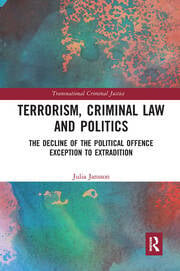
|
Terrorism, Criminal Law and Politics: The Decline of the Political Offence Exception to Extradition
Recent atrocities have ensured that terrorism and how to deal with terrorists legally and politically has been the subject of much discussion and debate on the international stage. This book presents a study of changes in the legal treatment of those perpetrating crimes of a political character over several decades. It most centrally deals with the political offence exception and how it has changed. The book looks at this change from an international perspective with a particular focus on the United States. Interdisciplinary in approach, it examines the fields of terrorism and political crime from legal, political science and criminological perspectives. It will be of interest to a broad range of academics and researchers, as well as to policymakers involved in creating new anti-terrorist policies.
|
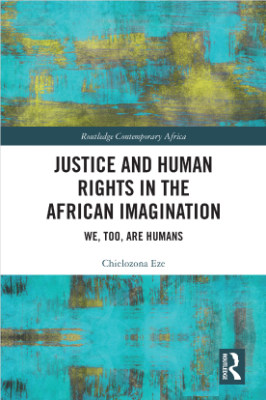
|
Justice and Human Rights in the African Imagination: We, Too, Are Humans
Justice and Human Rights in the African Imagination is an interdisciplinary reading of justice in literary texts and memoirs, films, and social anthropological texts in postcolonial Africa.
Inspired by Nelson Mandela and South Africa’s robust achievements in human rights, this book argues that the notion of restorative justice is integral to the proper functioning of participatory democracy and belongs to the moral architecture of any decent society. Focusing on the efforts by African writers, scholars, artists, and activists to build flourishing communities, the author discusses various quests for justice such as environmental justice, social justice, intimate justice, and restorative justice. It discusses in particular ecological violence, human rights abuses such as witchcraft accusations, the plight of people affected by disability, homophobia, misogyny, and sex trafficking, and forgiveness.
This book will be of interest to scholars of African literature and films, literature and human rights, and literature and the environment.
|
|
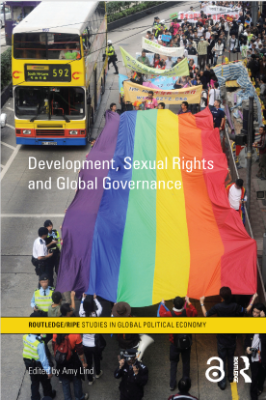
|
Development, Sexual Rights and Global Governance
This book addresses how sexual practices and identities are imagined and regulated through development discourses and within institutions of global governance. The underlying premise of this volume is that the global development industry plays a central role in constructing people’s sexual lives, access to citizenship, and struggles for livelihood. Despite the industry’s persistent insistence on viewing sexuality as basically outside the realm of economic modernization and anti-poverty programs, this volume brings to the fore heterosexual bias within macroeconomic and human rights development frameworks. The work fills an important gap in understanding how people’s intimate lives are governed through heteronormative policies which typically assume that the family is based on blood or property ties rather than on alternative forms of kinship. By placing heteronormativity at the center of analysis, this anthology thus provides a much-needed discussion about the development industry’s role in pathologizing sexual deviance yet also, more recently, in helping make visible a sexual rights agenda.
Providing insights valuable to a range of disciplines, this book will be of particular interest to students and scholars of Development Studies, Gender Studies, and International Relations. It will also be highly relevant to development practitioners and international human rights advocates.
|
|
|
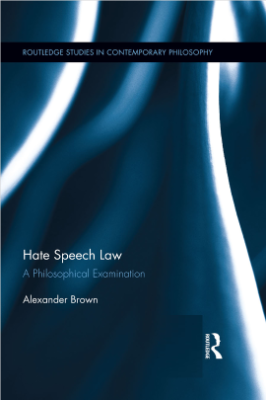
|
Hate Speech Law: A Philosophical Examination
Hate speech law can be found throughout the world. But it is also the subject of numerous principled arguments, both for and against. These principles invoke a host of morally relevant features (e.g., liberty, health, autonomy, security, non-subordination, the absence of oppression, human dignity, the discovery of truth, the acquisition of knowledge, self-realization, human excellence, civic dignity, cultural diversity and choice, recognition of cultural identity, intercultural dialogue, participation in democratic self-government, being subject only to legitimate rule) and practical considerations (e.g., efficacy, the least restrictive alternative, chilling effects). The book develops and then critically examines these various principled arguments. It also attempts to de-homogenize hate speech law into different clusters of laws/regulations/codes that constrain uses of hate speech, so as to facilitate a more nuanced examination of the principled arguments. Finally, it argues that it is morally fitting for judicial and legislative judgments about the overall warrant of hate speech law to reflect principled compromise. Principled compromise is characterized not merely by compromise over matters of principled concern but also by compromise which is itself governed by ideals of moral duty or civic virtue (e.g., reciprocity, equality, and mutual respect).
|
|
|
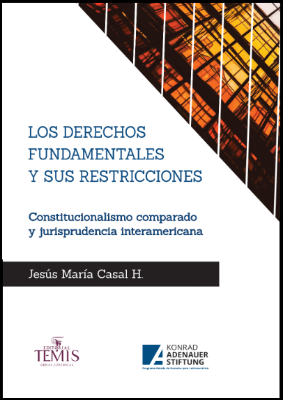
|
Los derechos fundamentales y sus restricciones: Constitucionalismo comparado y jurisprudencia interamericana
La obra del Profesor Jesús María Casal es de suma importancia. Reflexiona sobre la multifuncionalidad de los derechos fundamentales desde el prisma de sus limitaciones, las cuales deciden finalmente sobre el alcance de la defensa real de la libertad. Al mismo tiempo ilustra extraordinariamente lo que una ciencia jurídico-constitucional transnacional es capaz de aportar para el desarrollo del derecho nacional. El lector es conducido magistralmente por los distintos ámbitos de la moderna dogmática de los derechos fundamentales. La separación funcional jurídico-teórica de los derechos fundamentales en reglas y principios es tratada e interpretada de manera precisa, al igual que la distinción estructural entre derechos de libertad y derechos sociales, la cual pierde diametralidad en virtud del enriquecimiento de los derechos de libertad con componentes prestacionales. A ello se suman la propia perspectiva de análisis y los aportes del autor en estas materias.
El propósito principal de la obra es, sin embargo, con el trasfondo de una comprensión diferenciada de los derechos fundamentales, hacer controlables las restricciones de los derechos fundamentales en un proceso argumentativo racional y transparente. La práctica muestra que los derechos fundamentales solo despliegan su plena eficacia cuando son tomados en serio como normas y su limitabilidad está sometida a criterios claros. Por eso, la estructuración del examen de licitud en materia de derechos fundamentales, es decir, la determinación de si un derecho fundamental es vulnerado por una ley de manera general o por una medida individual en el caso concreto, se convierte en la tarea central del constitucionalista.
|
|
|
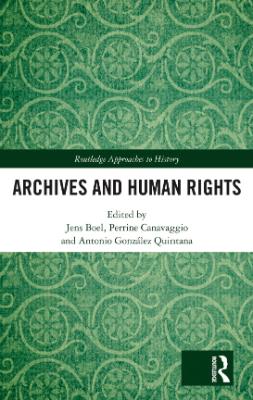
|
Archives and Human Rights
Why and how can records serve as evidence of human rights violations, in particular crimes against humanity, and help the fight against impunity? Archives and Human Rights shows the close relationship between archives and human rights and discusses the emergence, at the international level, of the principles of the right to truth, justice and reparation.
Through a historical overview and topical case studies from different regions of the world, the book discusses how records can concretely support these principles. The current examples also demonstrate how the perception of the role of the archivist has undergone a metamorphosis in recent decades, towards the idea that archivists can and must play an active role in defending basic human rights, first and foremost by enabling access to documentation on human rights violations.
Confronting painful memories of the past is a way to make the ghosts disappear and begin building a brighter, more serene future. The establishment of international justice mechanisms and the creation of truth commissions are important elements of this process. The healing begins with the acknowledgement that painful chapters are essential parts of history; archives then play a crucial role by providing evidence. This book is both a tool and an inspiration to use archives in defence of human rights.
|
|
|
|
|